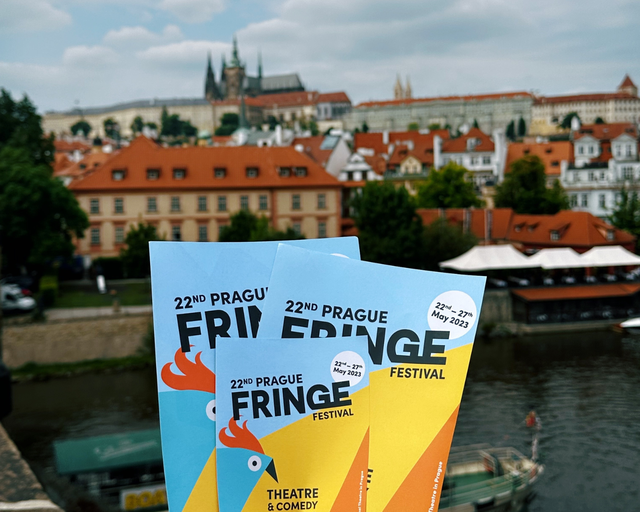How Can The Spirit Of Fringe Festivals Survive in the Current Arts Climate: Lessons Learnt from Prague Fringe
24.05.23
Lorn Elvin is a musician, writer and performer based in London creating folk gig theatre exploring identity, relationships and connection. Lorn is an avid fringe theatre attendee being a regular visitor to UK fringe festivals.
As well as working as Mobius' Senior PR Account Executive, they have just opened their debut solo show, How To Fall In Love Again at this year's Prague Fringe Festival.
Fringe theatre festivals have been a highly discussed topic of debate this and last year. From astronomical accommodation costs, plummeting ticket sales and financial accessibility for grassroots and early-career artists, many creators have been wondering if it is all still worth it? Are fringe festivals still buzzing, creative hubs where artists can thrive, or have years of under funding and a seemingly increasingly unsupportive environment of some large fringe festivals caused them to feel soulless?
The answer to grassroots festivals may lie in the boutique fringe festivals of Europe, and one in particular has caught the attention of artists from all over the world. Set in the picturesque winding streets of Prague’s Malá Strana, across the tourist packed Charles Bridge, you will find the hidden pocket of imagination and artistry that is the Prague Fringe Festival. Currently in its 22nd year after its humble beginning in 2002, Prague Fringe attracts around 6000 audience members a year to an average of 200 performances over just six days, and whilst these numbers are much smaller than the likes of Edinburgh, what Prague has in exceeding quantities is heart.
Led by the astonishingly passionate founder and director, Steve Gove, Prague Fringe is run entirely by volunteers from all over the world, giving their time to artists who have travelled from far and wide to be a part of the festival, and it really is the people behind the scenes who make this event so special. You will find the friendliest of volunteers who radiate joy and support artists with such care and patience. It is no wonder independent creators are willing to travel halfway around the globe to take a leap of faith with their work in a country they may not have an audience base in.
The real stand out aspect of Prague Fringe though is the sense of community amongst the artists in the programme. You’d be hard pressed to find stress around ticket sales, nervousness for reviews or even a hint of competitiveness between them. There is a universal understanding of the value of support and encouragement, with artists continually having eachothers’ backs, shouting out fellow creators online and even in their shows, and attending as cheering, proud audience members for one another.
So what can we learn from the creators of Prague Fringe? We can learn to find our way back to what the spirit of fringe festivals should be: grassroots artists coming together and celebrating each other's work for the pure enjoyment and thrill of being there. Afterall, that is how the Edinburgh Festival Fringe began, with artists showing up to the existing International Festival and performing in quirky venues on the fringes of the festival (hence the name) not to critics or with any intention of ‘making it’, but just because they could! By refocusing our intentions as artists creating fringe theatre away from the tempting fixation on sales, audience size, and awards, and focusing instead on community, experience and celebration, we can rekindle our wavering relationships with the fringe festival. This is not to say that career elevation is not important, and not a valid thing to want to achieve from a fringe festival, it just may be healthier for us as artists to remember why we started creating in the first place in order to retain that wide eyed excitement and passion. This is what Prague Fringe has done, created a vibrant atmosphere that puts the art at the centre of the festival, and the sales out on the side lines. Perhaps we can reignite our love of fringe festivals by also paying some more recognition to the boutique festivals taking place across the UK, the likes of Bedford, Buxton and Ventnor to name just a few.
True, a boutique fringe may not offer the same level of exposure or career mobility that Edinburgh might, but it does guarantee something some might argue is far more valuable, the feeling of validity and affirmation that flows through the unique interactions and outpouring of love that Prague Fringe has in abundance. The spirit of fringe theatre lives on in the magic that is Prague Fringe, and it can live on too with us resurfacing the magic that exists still in the fringe festivals of the UK.
Have you worked with a smaller boutique Fringe festival? Did you learn anything that could be applied to larger arts festivals to keep the spirit of Fringe and new work alive? We'd love to hear about your thoughts and experiences so please do get in touch.
If you'd like to keep up to date with all our blog posts, important and interesting stories in the worlds of theatre, arts and media, plus job ads and opportunities from our industry friends, sign up to our daily media briefing at this link.



